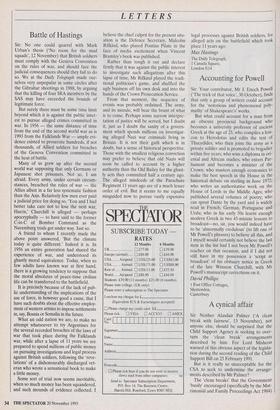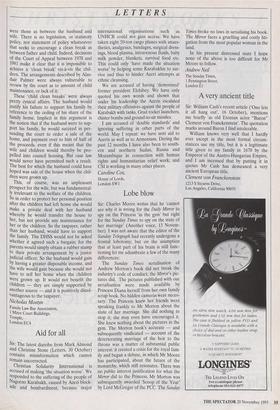A cynical affair
Sir: Neither Alasdair Palmer CA clean break with fairness', 13 November), nor anyone else, should be surprised that the Child Support Agency is seeking to over- turn the 'clean break' arrangements described by him. For Lord Mishcon warned of this obvious aspect of the legisla- tion during the second reading of the Child Support Bill on 25 February 1991.
But is it really so unacceptable for the CSA to seek to undermine the arrange- ments described by Mr Palmer?
The 'clean breaks' that the Government `busily' encouraged (specifically by the Mat- rimonial and Family Proceedings Act 1984)
LETTERS
were those as between the husband and wife. There is no legislation, or statutory Policy, nor statement of policy whatsoever that seeks to encourage a clean break as between father and child. Indeed, decisions of the Court of Appeal between 1978 and 1981 make it clear that it is impossible to achieve a 'clean break' vis-à-vis the chil- dren. The arrangements described by Alas- dair Palmer were always vulnerable to review by the court as to amount of child maintenance, or lack of it.
These 'child clean breaks' were always pretty cynical affairs. The husband would justify his failure to support his family by reference to the ceding of his share of the family home. Implicit in this argument is the notion that if the husband were to sup- port his family, he would succeed in per- suading the court to order a sale of the home, and payment over to him of half of the proceeds, even if this meant that the wife and children would thereby be pro- pelled into council housing. But case law would never have permitted such a result. The best for which the husband could have hoped was sale of the house when the chil- dren were grown up. This, of course, was an unpleasant Prospect for the wife, but was fundamental- ly irrelevant to the welfare of the children. So in order to protect her personal position after the children had left home she would make a private deal with her husband whereby he would transfer the house to her, but not provide any maintenance for her or the children. So the taxpayer, rather than her husband, would have to support the family. The DHSS would not be asked whether it agreed such a bargain; for the parents would simply obtain a rubber stamp to their private arrangement by a junior Judicial officer. So the husband would gain by having a greater disposable income, and the wife would gain because she would not have to sell her home when the children were grown up. It would not benefit the children — they are simply supported by another source — and it is positively disad- vantageous to the taxpayer.
Nicholas Mostyn Family Law Bar Association, 1 Mitre Court Buildings, Temple,
London EC4











































































 Previous page
Previous page